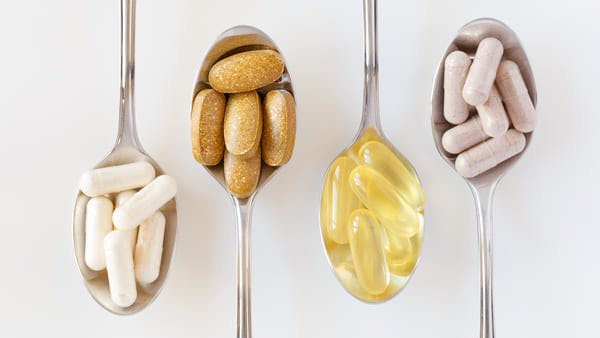Choosing a Daily Multivitamin
Are you thinking about adding a multivitamin dietary supplement to your daily routine? Taking dietary supplements like multivitamins can be a great way to support overall health and help manage certain health conditions,i but taking a multivitamin is not a one-size-fits-all solution. When choosing a daily multivitamin, it’s important to look at the list of vitamins and nutrients that it contains, as well as the quantity of ingredients. It’s also essential to talk to your doctor before beginning any supplement. Read on to learn about choosing a daily multivitamin so that you can enter the vitamin and supplement aisle at your local pharmacy or grocery store with confidence.

What Is a Multivitamin?
A multivitamin is a dietary supplement that is formulated with a combination of vitamins, minerals, and sometimes additional dietary ingredients.ii There are a wide range of multivitamins available, with ingredients and ingredient quantities varying from manufacturer to manufacturer. Multivitamins contain most of the essential vitamins and minerals and are designed to be taken once or twice per day.iii There are also high-potency multivitamins available as well as multivitamins that are promoted for specific purposes like energy support and immune health support.iv
On a multivitamin’s label, you’ll see something called “Daily Value” that informs the consumer which vitamins and minerals are included and in what percentages.v However, keep in mind the vitamins and nutrients each individual needs can vary from person to person. If you’re unsure whether or not you should take a daily multivitamin, consult your doctor for guidance.
Why Should I Take a Multivitamin?
Dietary supplements are not an adequate replacement for eating a healthy and varied diet. However, for those who may not always get enough of the vitamins and nutrients their bodies need, a multivitamin might be a good choice. A multivitamin can help you fill nutritional gaps and support your health when your daily diet doesn’t meet all of your nutritional needs.
Making Sense of the Label: What Ingredients Should I Look For?
Every multivitamin differs in ingredients and ingredient amounts depending on its manufacturer and its target consumer. However, there are some common vitamins and nutrients that you’ll see commonly included on the ingredient’s label of many multivitamins..
Vitamin A
This fat-soluble vitamin may be best known for supporting eye health. However, it also plays a role in supporting immune health, as well as overall health, helping the hearts, lungs, and kidneys to work properly.vi Vitamin A can be found in dietary supplements in the form of retinyl palmitate, retinyl acetate, or beta-carotene.viii Vitamin A is found naturally in many foods including salmon, green leafy vegetables, broccoli, carrots, squash, cantaloupe, apricots, mangos, and dairy products.ix
Vitamin C
From its antioxidant properties that protect cells from free radical damage, to helping the body make collagen, to improving the body's ability to absorb iron from plant-based foods, to supporting immune health, vitamin C helps support your health in a variety of ways.x Vitamin C can be found naturally in a number of fruits and vegetables, including citrus fruits like oranges and grapefruit, red and green peppers, broccoli, strawberries, cantaloupe, baked potatoes, and tomatoes.xii
Vitamin D
Vitamin D is a vitamin that helps the body absorb calcium, which is important for bone health.xiii Vitamin D also plays a role in helping support muscle health, the nervous system, and the immune system.xiv Vitamin D deficiency may lead to rickets and osteomalacia, health conditions in which bones become soft, thin, and brittle.xv
Niacin
Niacin is a nutrient that helps the body turn food into energy and supports cell development and function.xvi It is found naturally in a number of foods including poultry, beef, pork, fish, some nuts, legumes, and grains. Some foods like breads and cereals are enriched with niacin.xvii
Vitamin E
This essential nutrient plays a role in a number of processes in the body. Vitamin E is an antioxidant that helps protect cells against free radical damage, and supports the body’s immune system, in addition to supporting other cell functions.xviii Vegetable oils like wheat germ oil, sunflower oil, and safflower oil, nuts like peanuts, hazelnuts, and almonds, sunflower seeds, and green vegetables are all natural food sources of vitamin E.xix
Tablet Versus Chewable versus Gummy: What Are My Options?
Multivitamins are available in a number of forms, including tablets that are swallowed and gummies that are chewed. Whichever form of vitamin you choose to take is up to you! Some people prefer gummies or chewable vitamins because they’re available in fruity flavors that taste better than multivitamins in tablet form. If you have trouble swallowing pills, opting for a chewable option might be the right choice for you. If you’re looking for more nutrients packed into a smaller serving size, choosing a tablet multivitamin that you swallow might be the better option. The non-active ingredients in multivitamin gummies versus tablets may also vary—be sure to read the product label, especially if you follow a plant-based or gluten-free diet and want to avoid certain ingredients.
We hope this guide to choosing a daily multivitamin has helped you understand some of the different options out there when it comes to dietary supplements. If you’re considering taking a supplement, be sure to ask your doctor if it’s okay to start first.










